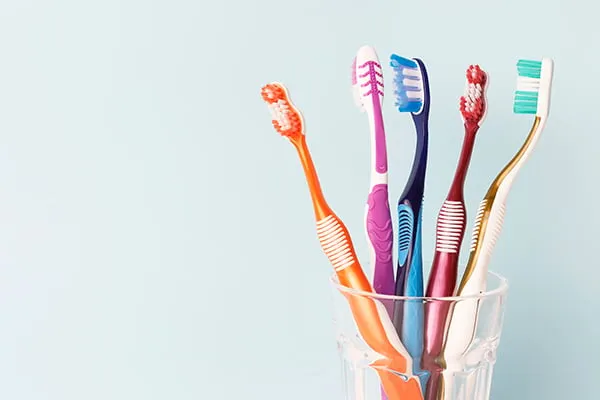7 Simple Habits to Keep Your Teeth Healthy

Taking care of your teeth and gums is one of the most important things you can do for your overall health.
Healthy teeth serve as a gateway to the rest of your body, impacting your heart, lungs, bones, and more.
Yet when it comes to prioritizing health and wellness habits, our teeth can often take a backseat.
Be honest: Do you think about your teeth other than when you brush them? Do you floss regularly? Do you postpone making dental appointments?
In order to make (and keep) dental health a priority in your life, here are seven self-care habits that can help maintain healthy teeth and gums.
1. Brushing Regularly
The best habit for healthy teeth is brushing them regularly.
“This will manage the bacterial load in your mouth, which, if unmanaged, can affect other aspects of your health, such as cardiovascular function,” explains Lilya Horowitz, D.D.S., F.A.G.D., of Domino Dental.
And don’t rush when you brush.
The American Dental Association recommends brushing for two minutes twice a day, so set a timer and be patient.

2. Choosing the Right Toothbrush
Make sure you’re brushing with the right toothbrush to keep healthy teeth and gums happy.
Horowitz recommends a soft toothbrush that “does not irritate the gums or enamel, but should also be able to remove surface stains to keep your teeth bright,” she says.
Even with soft bristles, don’t brush too hard, which can irritate your gums or damage tooth enamel over time.
“Healthy, pink gums are not inflamed nor should they bleed,” Horowitz says.
And be sure to replace your brush every three to four months, or when the bristles are starting to show wear.
An electric toothbrush can prevent you from brushing too hard, but a manual one is fine, too.
3. Flossing Daily
If you think floss is mostly for removing pesky bits of food from in between your teeth, think again.
Flossing daily plays a bigger role in maintaining healthy teeth and gums.
“Flossing removes plaque and bacteria from below the gum line and also introduces oxygen into the area,” Horowitz says. “Many types of bacteria that cause gum disease are anaerobic, meaning they don’t thrive when introduced to oxygen.”
Flossing regularly can also help improve your breath by removing the bacteria that cause it to smell foul!

4. Drinking Plenty of Water
Need another reason to drink more water during the day? Staying hydrated can help keep your teeth healthy.
“Water helps remove plaque and food debris from teeth,” Horowitz explains.
“This maintains a more alkaline oral environment after eating and drinking.”
That shift in pH matters because it’s the acid produced by bacteria (as they chow down on sugars and other food debris on your teeth) that causes cavities and decay.
5. Eating a Healthy Diet
“What you eat can have a significant impact on your oral health,” says Shannon Henry, R.D., of EZCare Medical Clinic.
Ditch the sugary snacks and drinks (and processed, starchy foods) and replace them with whole foods, including plenty of fruit and vegetables.
Essential nutrients like vitamin D, calcium, magnesium, and phosphorus play important roles in maintaining strong bones and healthy teeth, so make sure you’re eating a well-balanced diet.
6. Quitting Smoking (and Vaping)
For healthy teeth and gums, put down the cigarettes and vape pens.
“Smoking constricts blood vessels and prevents correct distribution of oxygen,” Horowitz says, “which is a risk factor for gum disease and premature tooth loss.”
Smoking raises your risk of gum disease and infections (since it weakens your immune system) — and it can cause unsightly stains and discoloration, too.
7. Chewing Gum When You Can’t Brush
When you can’t brush or are craving something sweet, it’s perfectly fine to reach for sugar-free gum, says Henry.
“Sugar-free chewing gum increases the salivary flow in your mouth,” she says. “Saliva can wash away food, neutralizes acid in the mouth, and can repair damaged teeth.”
Look for gum sweetened with xylitol, a naturally occurring sugar alcohol, that shows promise in preventing cavities and supporting healthy teeth.
How To Get Nice Teeth
This article will offer a complete guide for how to get nice teeth. Follow the steps below to ensure that your smile stays looking great for longer.
Teeth are very conspicuous parts of the human body. They are ordinarily the first to get noticed. This happens mainly when we smile. The smell, appearance, and overall health of the teeth determine the confidence with which we interact and cope with others. That is why they have to be well taken care of at all times. We are going to discuss four of the various means and ways of doing so in this short guide.
How to Get Nice Teeth
Whereas the desire to obtain white teeth is noble, it may not necessarily be possible to do so. This is because no one is completely perfect. It is, however, possible to attain healthy and beautiful smiles that exude your personal confidence. In light of this, it is in your best interest to care for your teeth and find the most suitable ways and means of improving your teeth’s cosmetics.
Brushing the Teeth
Start by brushing your teeth regularly. You are advised to do so at least two times a day. This prevents the formation of cavities and the proliferation of gum diseases.
While brushing, pay keen attention to the kind of toothbrush you employ for the job, the intensity with which you engage the toothbrush and the toothpaste you utilise.
The British Dental Association recommends that you use a toothbrush with soft bristles so as to minimise damage to the gums.
Certain dental products contain soft bristles. These are pretty good at eliminating food particles and debris without inflicting the feelings of irritations. They do not also scratch the enamel or the gums and slide smoothly in between the teeth.
You are advised against using a toothbrush that comprises hard or firm bristles. This may impose too much stress on your teeth and inflict some damage to the gums. By the same token, you should also apply moderate force when brushing your teeth. This is to prevent your teeth and gums from sustaining harms.
To do this, hold the brush at an angle of around 45 degrees. Brush gently and be sure to reach all the areas of your teeth such as the front, the back, and the upper portions. Use toothpaste that contains fluoride in order to offer protection to your teeth from the dangers.
What Causes Plaque on Teeth?
For a start, plaque refers to the colourless coating which comprises bacteria and sugar. Whereas it is unavoidable, it may nonetheless be mitigated. The foods we eat are what encourage the growth of bacteria. It is this growth that subsequently forms the plaque. If not dealt with in time, the plaque hardens into tartars which eventually cause tooth decays. This is a yellowish or brownish mineral which deposits at the gum line.
Immediately we place any food or drink in the mouth, the acids that are present in the food begin attacking the teeth. If this attack is not stopped in time, the tooth enamel may break down completely. This may give rise to a cavity which may require extra effort to fill or restore. It may also inflame or irritate the gum line region of the teeth. These two may in turn case redness, excessive gum bleeding, gingivitis, periodontal diseases, and ultimately, tooth loss.
How long does it take for a cavity to form?
Cavities take long to form. They may take weeks or even years to do so. That is why a visit to the dentist once in every six months is strongly recommended. This long duration is occasioned by the fact that conditions may not always be ripe for demineralisation of the teeth. This is what actually causes the teeth to develop cavities.
For this to happen, an acidic environment has to exist in the mouth. These acids mainly arise from the foods we eat. They in turn feed bacteria that dwell in the dental plaque. In most instances though, this acidic environment is not always present. Most of the time, the pH of the ordinary mouth is around 7, which is considered safe.
Once in a while though, this value falls below 5.5 levels or below. When this happens, the mouth becomes acidic and encourages the damage of the teeth. If this damage persists for longer, a tipping point may eventually be reached. This is a point where the combined impact of the minute demineralisation builds up to the formation of cavities.
How much does it cost to get your teeth professionally whitened?
Tooth whitening is a procedure that is aimed at making the teeth to appear white. This is to afford broader smiles and is particularly handy when the teeth are stained or dark. The DNA determines to a large extent the colour of our teeth. A dentist can therefore not bring about the fundamental alteration of the colour of our teeth. They can only lighten the existing shades.
This procedure is not for everyone. It is only for those who have healthy teeth that are devoid of any fillings, or braces. It is also effective for those who have yellow tones in their teeth.
Perhaps the whitening kits are by far the most recommended means of carrying out this procedure. They cost between £10 and £200.
Professional teeth whitening services, on the other hand, vary depending mainly on the kind of procedure opted for. It mainly entails the use of a custom-fitted tray and a gel.
The cost of this procedure ranges from £200 to £1,300. Ultimately, it is your dentist to determine the procedure that best suits your unique circumstance.
How can I whiten my teeth in one day?
The easiest and the quickest way of removing stains or discolourations from your teeth are to pay a visit to the cosmetic dentist. These professionals utilise sophisticated teeth whitening strips and fluids which are faster in their actions.
These methods, while effective, are not safer for your teeth in the long run. You are hence advised against using them regularly and for a prolonged duration of time.
Several other less expensive means and ways of whitening the teeth do exist also. Some of them are do-it-yourself and you can thus attempt on your own at home. They are cheaper and safer also. Some of them are:
Apple cider vinegarBaking soda and lime juiceBanana peelCoconut oilOrange oilSesame oilCharcoalGargling with peroxideSalt and lemonTurmericEpsom saltGuava leavesNeemOrange peelStrawberries
How to get nice teeth?
Well, the procedures and options we have disused above will surely help you out; but for the short run. For a permanent solution, we suggest that you go for full-scale tooth cleaning. You should do this preferably twice a year. This way, you will prevent the likelihood of the situations worsening or leading to permanent tooth damages. It goes without saying also that you have to visit dentists regularly.
Copyright 2022. All rights reserved.
This site is not a part of Google, Inc. or Google.com, nor is it sponsored or endorsed by Google. YouTube is a trademark of Google, Inc.
Disclaimer: This site is provided for educational purposes only.
Please consult a health professional before implementing any strategy discussed on this website.